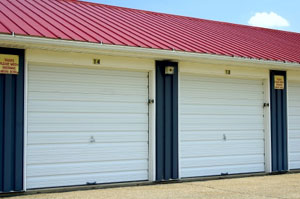|
 There are only a few types of self storage available to most of us and the pros and cons
of each should be carefully evaluated before you decide which one is right for you. Following is an overview
of the different types of self storage.
There are only a few types of self storage available to most of us and the pros and cons
of each should be carefully evaluated before you decide which one is right for you. Following is an overview
of the different types of self storage.
Self Storage Facilities
A self storage facility basically provides a "room" that looks similar to a garage but is typically
windowless and has a simple access door that rolls up much like a garage door. These types of units are
typically connected to units of the same size and from the outside they generally look like garages that
are "linked" together. Locks for these units are provided by the renter of the unit and are
generally used for longer term storage than some of their other self storage counterparts.
The advantages of using these types of storage facilities are that they generally are accessible most
of the time without having to worry about someone being on site to allow you access, they generally have
a "ramp" that allows you to move things in and out easily (or even drive your car up to the door)
and they allow you to walk around inside of them easily. Want more info? You may wish to read our article
about accessing your self storage unit.
Some of the downfalls of this type of storage are not as easily identified as you'd think but one of the biggest
downfalls can be security. Typically these facilities will have cameras installed in various strategic locations
to discourage anyone breaking into a unit or accessing your unit illegally. Another common concern for this type
of facility is the lots where they reside need to plowing and in particularly bad weather conditions they may not
be as accessible as you'd like them to be due to heavy snowfall or icing.
Self Storage "Pods" in Warehouses
These types of self storage units are generally constructed from wood or metal and to be taller than they are
wide allowing easy storage of such things as mattresses, bed frames, tall dressers and desks and other bulky items.
These "pod" style storage units are then stored in a warehouse with other units which are almost always of
the same size and shape allowing the owner of the facility to "stack" units on top of each other.
The advantage to these units is that the facility owner will bring the unit to your home, allow you to fill
it to capacity and then pick it up and return it allowing you to only be concerned about loading your items once
(versus loading them into a truck, moving them and then unloading them to another location). This is a significant
advantage for those who are less able to do this type of heavy hauling. The security of the facility is rarely a
concern as the warehouse is open and has personnel that are on site and they only allow access to the units by the
person who actually stored the items. Locks are provided by the person renting the individual units.
One of the biggest downfalls of these types of units may be accessibility. Some of these facilities require a twenty
four to forty eight hour notice of your intent to access a unit and may also charge you a fee for this access.
Self Storage "Pods" - At Home
Another common type of self storage unit that has emerged over the last several years is the "at home"
storage pod. These pods are growing in popularity for those who are having their homes remodeled, are looking
for short term storage or simply need a little additional storage space at home.
There are some significant advantages to this type of storage including that the units are at your home and therefore
are accessible at all times, on your schedule as you care to go in and out of them. The locks are placed on the
individual units by you and the units are generally fairly weather resistant meaning you won't have to worry about them.
The downside of having this type of storage at home is that it can be expensive, weather considerations can result in
you not being able to access the unit and it can be large and unsightly taking up space in your yard. These types of
units are perfect if you are having your home remodeled or storing items that are going to be used for a yard or garage
sale, as they're best suited to short term versus long term storage.
Conclusion
Whatever type of self storage you decide is right for you be sure to check the terms and conditions of your contract
carefully and find out what your responsibilities are and what the terms of the owner of the units are. Be a responsible
consumer regardless of what your self storage needs are.
|